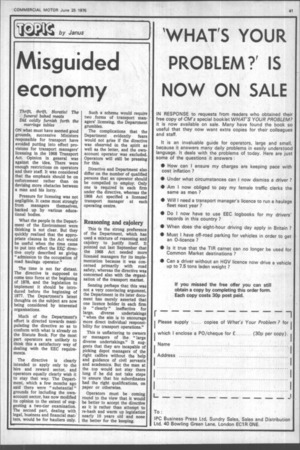Misguided economy
Page 43

If you've noticed an error in this article please click here to report it so we can fix it.
Thrift, thrift, Horatio! The funeral baked meats Did coldly furnish forth the marriage tables
ON what must have seemed good grounds, successive Ministers responsible for transport have avoided putting into effect provisions for transport managers' licensing in the 1968 Transport Act. Opinion in general was against the idea. There were enough restrictions on operators and their staff. It was considered that the emphasis should be on enforcement rather than on devising more obstacles between a man and his lorry.
Pressure for licensing was not negligible. It came most strongly from managers themselves, backed up by various educational bodies.
What the people in the Department of the Environment were thinking is not clear. But they quickly realised that the appropriate clauses in the Act would be useful when the time came to put into effect the EEC directive coyly described as giving "admission to the occupation of road haulage operator."
The time is not far distant. The directive is supposed to come into force at the beginning of 1978, and the legislation •to implement it should be introduced before the beginning of 1977. The Department's latest thoughts on the subject are now being considered by interested organisations.
Much of the Department's effort is directed towards manipulating the directive so as to conform with what is already on the Statute Book. For the most part operators are unlikely to think this a satisfactory way of dealing with the EEC requirements.
The directive is clearly intended to apply only to the hire and reward sector, and operators equally clearly wish it to stay that way. The Department, which a few months ago said there were "substantial " grounds for including the ownaccount sector, has now modified its opinion to the extent of suggesting a two-tier examination. The second part, dealing with legal, business and financial matters, would be for hauliers only. Such a scheme would require two forms of transport managers' licensing, the Department grumbles.
The complications that the Department evidently fears would not arise if the directive was observed in the spirit as well as the letter, and the ownaccount operator was excluded. Operators will still be pressing for this.
Directive and Department also differ on the number of qualified persons that an operator should be compelled to employ. Only one is required in each firm under the directive, whereas the 1968 Act specified a licensed transport manager at each operating centre.
Reasoning and cajolery
This is the strong preference of the Department, which has used a mixture of reasoning and cajolery to justify itself. It pointed out last September that the 1968 Act needed more licensed managers for its implementation because it was concerned primarily with road safety, whereas the directive was concerned also with the organisation of the transport market.
Sensing perhaps that this was not a very convincing argument, the Department in its later document has merely asserted that one licence holder in each firm is " clearly " ineffective for large, diverse undertakings " when the aim is to encourage more direct individual responsibility for transport operations."
This is unflattering to owners or managers of the "large diverse undertakings." It suggests that they are incapable of picking depot managers of the right calibre without the help and guidance of civil servants and academics. But the man at the top would not stay there long if he did not take steps to ensure that his subordinates had the right qualifications, on paper or otherwise.
Operators must be coming round to the view that it would be better to accept the directive as it is rather than attempt to re-hash and warm up legislation nearly 10 years old and none the better for the keeping.




















































































